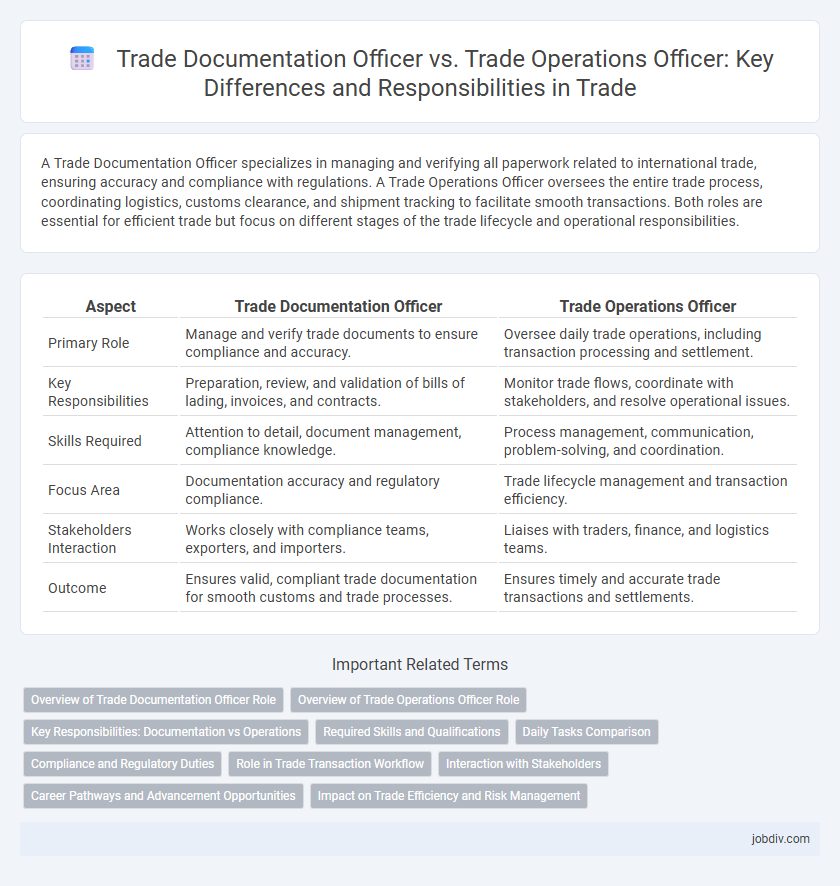A Trade Documentation Officer specializes in managing and verifying all paperwork related to international trade, ensuring accuracy and compliance with regulations. A Trade Operations Officer oversees the entire trade process, coordinating logistics, customs clearance, and shipment tracking to facilitate smooth transactions. Both roles are essential for efficient trade but focus on different stages of the trade lifecycle and operational responsibilities.
Table of Comparison
| Aspect | Trade Documentation Officer | Trade Operations Officer |
|---|---|---|
| Primary Role | Manage and verify trade documents to ensure compliance and accuracy. | Oversee daily trade operations, including transaction processing and settlement. |
| Key Responsibilities | Preparation, review, and validation of bills of lading, invoices, and contracts. | Monitor trade flows, coordinate with stakeholders, and resolve operational issues. |
| Skills Required | Attention to detail, document management, compliance knowledge. | Process management, communication, problem-solving, and coordination. |
| Focus Area | Documentation accuracy and regulatory compliance. | Trade lifecycle management and transaction efficiency. |
| Stakeholders Interaction | Works closely with compliance teams, exporters, and importers. | Liaises with traders, finance, and logistics teams. |
| Outcome | Ensures valid, compliant trade documentation for smooth customs and trade processes. | Ensures timely and accurate trade transactions and settlements. |
Overview of Trade Documentation Officer Role
A Trade Documentation Officer is responsible for preparing, verifying, and managing all trade-related documents such as invoices, bills of lading, and customs paperwork to ensure compliance with international trade regulations. This role involves close coordination with freight forwarders, customs brokers, and internal teams to facilitate smooth shipment and clearance processes. Accurate documentation handled by the Trade Documentation Officer mitigates risks of delays, penalties, and financial losses in trade operations.
Overview of Trade Operations Officer Role
Trade Operations Officers manage the end-to-end processing of international trade transactions, ensuring compliance with regulatory requirements and internal policies. They coordinate with various departments to facilitate smooth shipment, documentation, and payment processes, reducing the risk of delays and financial discrepancies. Their role requires expertise in trade finance, customs regulations, and supply chain management to optimize operational efficiency.
Key Responsibilities: Documentation vs Operations
Trade Documentation Officers manage the preparation, verification, and processing of essential trade documents such as invoices, bills of lading, and customs declarations to ensure regulatory compliance and smooth transaction flow. Trade Operations Officers oversee the end-to-end execution of trade activities, including shipment scheduling, coordination with logistics partners, and monitoring shipment status to optimize operational efficiency. The Documentation role prioritizes accuracy and compliance in paperwork, while the Operations role focuses on the practical coordination and execution of trade processes.
Required Skills and Qualifications
Trade Documentation Officers require proficiency in commercial documentation, knowledge of trade regulations, and attention to detail to ensure accurate processing of shipping and customs paperwork. Trade Operations Officers need strong analytical skills, expertise in supply chain management, and experience with trade compliance systems to manage daily logistics and operational efficiency effectively. Both roles demand solid communication skills and familiarity with international trade laws, but the Trade Operations Officer often requires advanced problem-solving abilities and coordination expertise.
Daily Tasks Comparison
Trade Documentation Officers primarily handle the preparation, verification, and management of all shipping documents such as bills of lading, invoices, and customs declarations to ensure compliance with international trade regulations. Trade Operations Officers focus on coordinating and monitoring the entire trade process, including shipment scheduling, communication with stakeholders, and resolving operational issues to guarantee smooth transaction flow. Both roles require close collaboration but differ in that Documentation Officers emphasize paperwork accuracy, while Operations Officers prioritize logistical efficiency and problem-solving.
Compliance and Regulatory Duties
Trade Documentation Officers ensure accuracy and completeness of shipping documents, customs declarations, and compliance with international trade regulations to prevent legal and financial penalties. Trade Operations Officers manage the end-to-end execution of trade transactions, focusing on adherence to compliance requirements, regulatory audits, and risk mitigation throughout the supply chain. Both roles are critical in maintaining trade compliance but differ as Documentation Officers emphasize document verification, while Operations Officers oversee broader regulatory adherence and operational controls.
Role in Trade Transaction Workflow
A Trade Documentation Officer is responsible for preparing, verifying, and managing all essential documents required for smooth trade transactions, such as invoices, bills of lading, and customs declarations. A Trade Operations Officer oversees the entire trade transaction workflow, coordinating between different departments to ensure compliance with regulatory requirements and timely execution of shipments. Both roles are critical in facilitating efficient international trade operations, but the Documentation Officer focuses more on paperwork accuracy while the Operations Officer handles process integration and communication.
Interaction with Stakeholders
Trade Documentation Officers collaborate closely with exporters, importers, and freight forwarders to ensure accurate preparation and validation of shipping documents, such as bills of lading and commercial invoices. Trade Operations Officers engage with customs authorities, banks, and logistics providers to facilitate smooth execution of trade transactions and compliance with regulatory requirements. Both roles require effective communication skills to resolve discrepancies and expedite the flow of goods across international borders.
Career Pathways and Advancement Opportunities
Trade Documentation Officers typically begin with roles centered on managing shipping documents and compliance, progressively advancing to supervisory positions focused on streamlining trade processes and ensuring regulatory adherence. Trade Operations Officers often start in operational roles handling transaction execution and logistics coordination, moving toward strategic roles overseeing trade workflows and risk management. Both career pathways offer advancement opportunities into trade compliance management, supply chain optimization, or international trade consultancy, leveraging expertise in documentation accuracy and operational efficiency.
Impact on Trade Efficiency and Risk Management
Trade Documentation Officers streamline trade efficiency by ensuring accurate, timely preparation and verification of shipping documents, reducing delays and compliance issues. Trade Operations Officers manage end-to-end trade processes, coordinating logistics, payment settlements, and regulatory adherence to mitigate operational risks and enhance transaction reliability. Both roles synergize to minimize trade disruptions and optimize risk management, ultimately driving smoother international trade operations.
Trade Documentation Officer vs Trade Operations Officer Infographic

 jobdiv.com
jobdiv.com